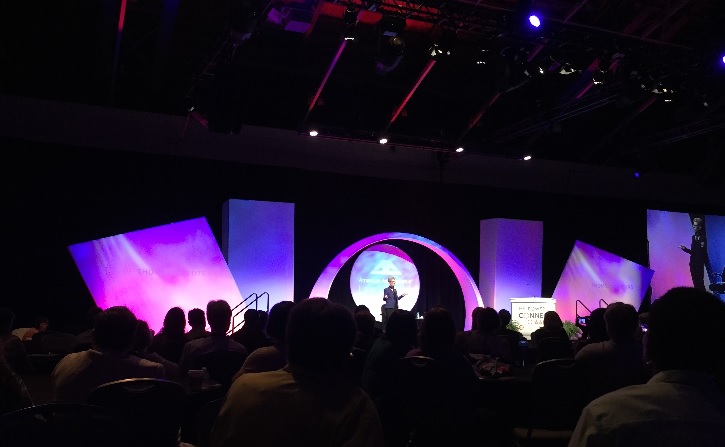AALL Annual Meeting keynote speaker Terry Gross

The American Association of Law Libraries (AALL) Annual Meeting is in Philadelphia, PA this year, and this morning’s keynote speech was given by Terry Gross, host and executive producer of Fresh Air on NPR.
Gross began her keynote by talking about the paradoxical profession she is in. She considers herself a very private person, yet she asks people very personal questions for a living. Gross considers herself to have a unique perspective on this because, as a private person, she understands that she is asking people to bare their souls and if they are hesitant to do so or they feel a certain question might be too personal, she won’t press the issue.
She is also in somewhat of an interesting position because she rarely gets the chance to look her subjects in the eye when she interviews them. Because NPR can’t afford to fly everyone to the Philadelphia studio where Gross records the show, they send subjects to their nearest NPR studios and they hook up via satellite.
Gross then talked about some of her more memorable interviews. She said that while she is willing to give people do-overs if they don’t like the way they answered a certain question, this is a liberty she never offers to politicians. Gross used Hillary Clinton as an example. When Clinton was on the show several years ago, Gross asked her about her view on gay marriage and how her opinion seemed to shift from being an opponent to being a supporter. After Clinton talked around the question a couple times, Gross said she didn’t feel like Clinton was answering the question, and a bit of a “back and forth” developed, with Clinton still not really answering the question. The clip went viral before NPR even had a chance to post the interview to their website, when a right-wing group called America Rising posted it all over social media.
She also talked about the consequences that celebrities face when they speak so openly to her. Gross mentioned a George Clooney interview she conducted several years ago after Clooney injured himself on the set of Syriana and began suffering from debilitating headaches. He told Gross that he didn’t use pain killers because of their addictive nature, but that he used pain management techniques, yet the pain was often unbearable. Shortly after the interview aired, the New York Post ran the sensationalized headline: “George Clooney: Torment made me suicidal, I can’t live like this.” As a result, Clooney had to do a ton of damage control, unfortunately.
Gross briefly talked about the differences between working in commerical radio versus public radio. She referenced an interview she did with Gene
Simmons of Kiss, where he was rude and obnoxious, and she called him out on it. There was a huge reaction to the interview, and she realized that if she worked in commercial radio, her executive producers would have her get in someone’s face every week, knowing that she can get a reaction since it makes for good radio. But she doesn’t call people on things to get ratings, which is why she is thankful to work in public radio.
The keynote took a sad turn when Gross talked about an interview with Vic Chestnutt, where she asked him about a song he wrote about suicide. He admitted to trying to kill himself a few times in the past, but that he wasn’t ready for death, which was the basis of his song, titled “Flirted With You All My Life.” A few weeks after the interview, Chesnutt attempted suicide again and this time succeeded. Gross learned from that experience that life is short and, for some of us, filled with pain. “It’s possible that someday, an interview I conduct with someone will be played back as part of their obituary,” she said. “This fills me with a huge sense of responsibility.”
So why does Gross do what she does for a living? What is the value of a personal narrative? “I’m just really interested in people,” she said. “I’d like my guests to reveal to me who they are when they are home alone and naked. But I know that won’t happen. And frankly, it shouldn’t happen. Privacy is a right.” She went on to say that there are limitations on what an interview can deliver. However, she enjoys trying to get to the dark parts of people’s lives through their art, fiction, memoirs, etc.
Gross ended her keynote by talking about an interview she did with author Maurice Sendak. He was so emotional during their chat that he began crying a few times, talking about several loved ones who had recently passed and confronting his own impending mortality. At the end of their talk, he said to Gross, “live your life, live your life.” He died a few months later, but she often says to herself, “live your life, live your life,” in Sendak’s voice.
Finally, Gross thanked all the law librarians in the audience, saying, “I could not function without great research.”
